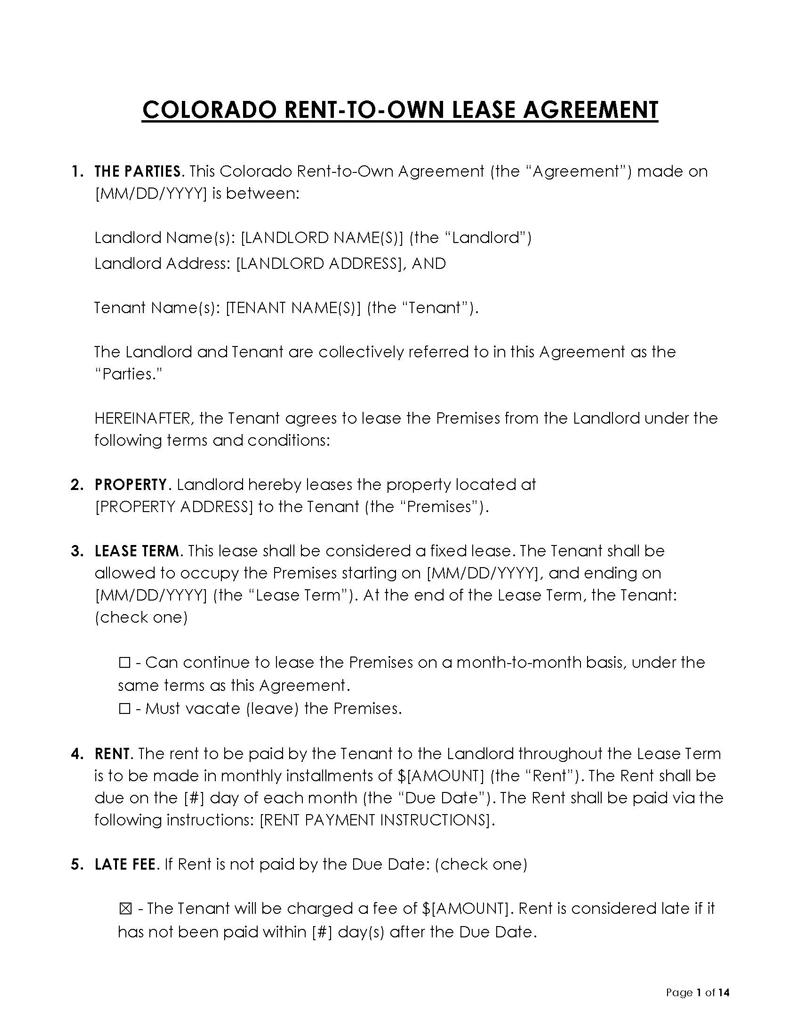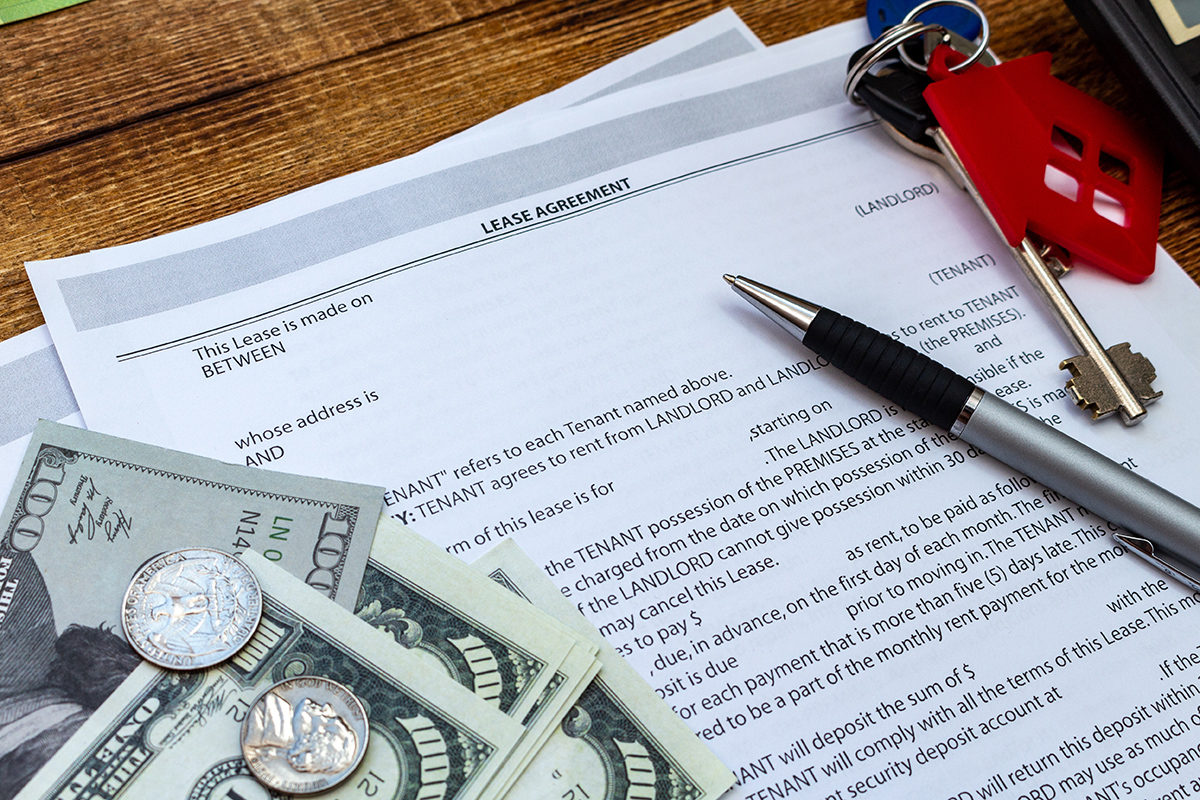A Colorado lease agreement is a legal contract between a landlord or property management company and a tenant regarding the lease of residential or commercial properties in Colorado.
The terms of a lease agreement include the length of the lease, the rent amount, and the rules for using the property. In Colorado, they do not require authentication by a notary public. Under Colorado state law, it becomes legally binding after all parties (landlord and tenant) sign the document.
A lease agreement is an important document for all landlord-tenant relationships in Colorado as authorized by Colorado Statutes Law; Title38 > Article 12 (Tenant & Landlord). For landlords, a well-written agreement can help to avoid potential legal disputes and ensure that tenants fulfill their obligations. For tenants, it can provide much-needed detail on their rights over the property durin their tenancy. Ultimately, it is an important tool for protecting the interests of both landlords and tenants.
A landlord needs to take the time to carefully draft a lease agreement that meets their needs; all conditions of the contract must be accepted and signed by the tenant(s) over 18 years old, and the tenant(s) should be handed a copy of the contract. A landlord should do a background and credit check on the tenant(s) to know if they can afford to renew the rental fee in the long run. Both parties must understand and agree to all the terms before signing. If either party breaches the agreement, they may be liable for damages.
Lease Agreement Requirements in Colorado
For a lease agreement to be complete and valid in Colorado, there are laws, disclosures, and addenda that are required. This will provide the tenant with important information about the property, the terms of the lease, their rights, and their responsibilities.
The following are the requirements.
Required disclosures
Required disclosures include both mandatory disclosures under federal law and disclosures that are entirely optional.
They are as follows:
1. Lead-based paint disclosure
According to the Colorado Statutes Law U.S. Code § 4852d, for houses built before 1978, a lease agreement must include the disclosure of information concerning lead-based paint because of the risk that lead-based paint poses to health. Each party must sign the lead warning form to validate the disclosure of lead-based paint’s existence on the property.
Furthermore, the landlord must tender an EPA (Environmental Protection Agency authorized booklet for a better understanding of the dangers associated with lead-based paint. The EPA has established guidelines for safe lead levels in soil, water, and air. Tenants would be aware of these guidelines and take steps to protect themselves from exposure. It is advised to divulge every other record or report concerning lead-paint-related hazards on the property as well as the building-wide evaluation.
2. Optional disclosure
When renting a property in Colorado, there are a number of disclosures and addenda that landlords may choose to declare to tenants. These optional disclosures include disclosing the landlord’s name and address, whether marijuana use is or isn’t allowed on the property, a move-in checklist, late and returned check fees, and shared utility arrangements.
Additionally, Colorado law recommends bed bugs and asbestos disclosure if the property contains these materials. Landlords may also choose to provide a mold disclosure if the property is located in an area with high moisture levels or has had previous issues with mold growth. It is not an obligation for landlords to provide these disclosures to tenants, but providing them can help ensure that all parties are on the same page regarding the state of the rental property.
Landlord’s access
There are no statutes regarding the landlord’s access in Colorado. However, there are standard practices for general access and emergency access.
A landlord can access a tenant’s dwelling for reasonable purposes such as safety inspections, repairs, or the need to show the property to prospective tenants. However, the landlord cannot simply enter the property whenever they please. It is recommended to give the existing tenant reasonable notice (24 hours). If the landlord violates these rules, the tenant may have grounds for terminating the lease agreement. On the other hand, the landlord can have immediate access without notifying the tenant in case of emergencies such as a fire outbreak or a fatal home accident.
Security deposit return laws
There are no statutes for the maximum amount of security deposits a landlord may charge under Colorado’s laws. A landlord has the freedom to charge the amount they want for security deposits. Although there is a security deposit return law (38-12-103 (1), C.R.S.,). It states that the landlord must refund the tenant’s full security deposit within one month after the end of the lease agreement or after the tenant tenders the key to the leased property. It may take more than one month if a later date is stated in the agreement, but not later than 60 days.
If the lease breaks due to hazardous conditions such as a gas equipment fault, the landlord shall ensure that the tenant gets their security deposit back within seventy-two (72) hours.
Rent increase notice
There are no statutes for specific grace periods or maximum fees concerning rent increase notice under the laws of Colorado.
According to Colorado Revised Statutes 2020; (§ 38-12-701), a rent increase notice is only required if the term is less than six months. The landlord must give the tenant twenty-one (21) days’ notice in such a case.

Free Templates
Given below are Colorado lease agreement templates:
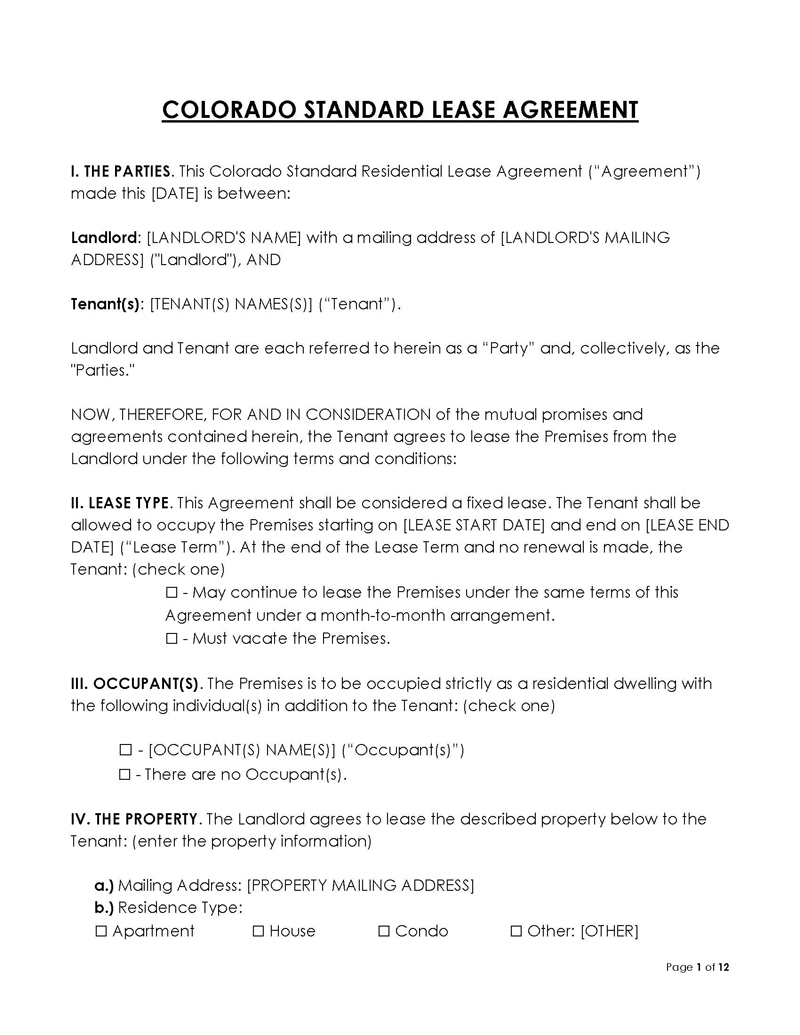

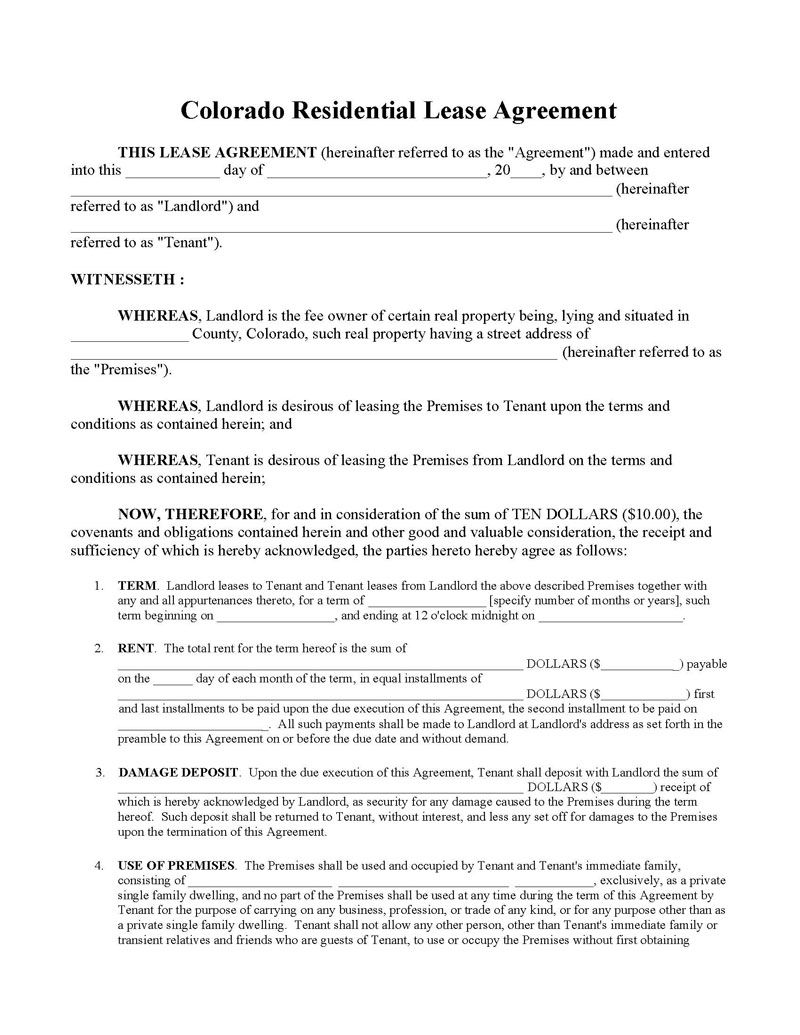

Colorado Rental Lease Agreements
All rental lease agreements in Colorado are legally binding and share similar elements. However, they have a few distinct differences that set them apart.
Each type is clarified below for your better understanding:
Commercial
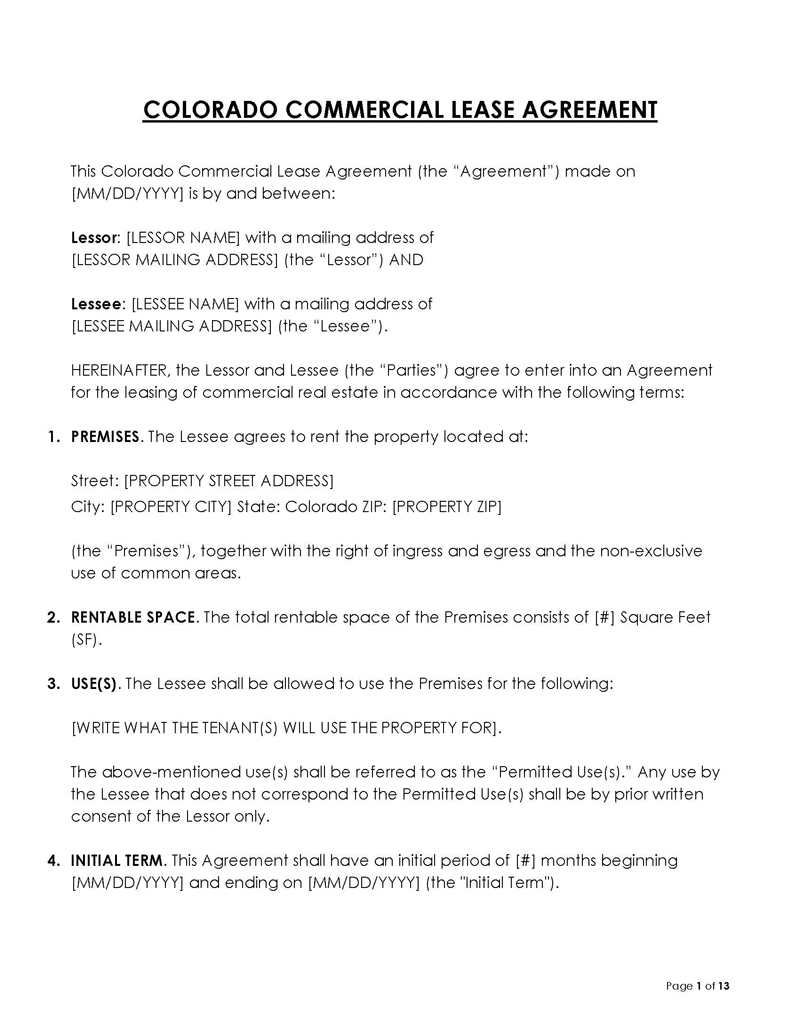
According to Title 4, Article 2.5: Colorado Revised Statutes, a commercial lease agreement is used to facilitate a legal contract between a landlord or property management company and a tenant regarding the lease of commercial properties in Colorado.
Month-to-month
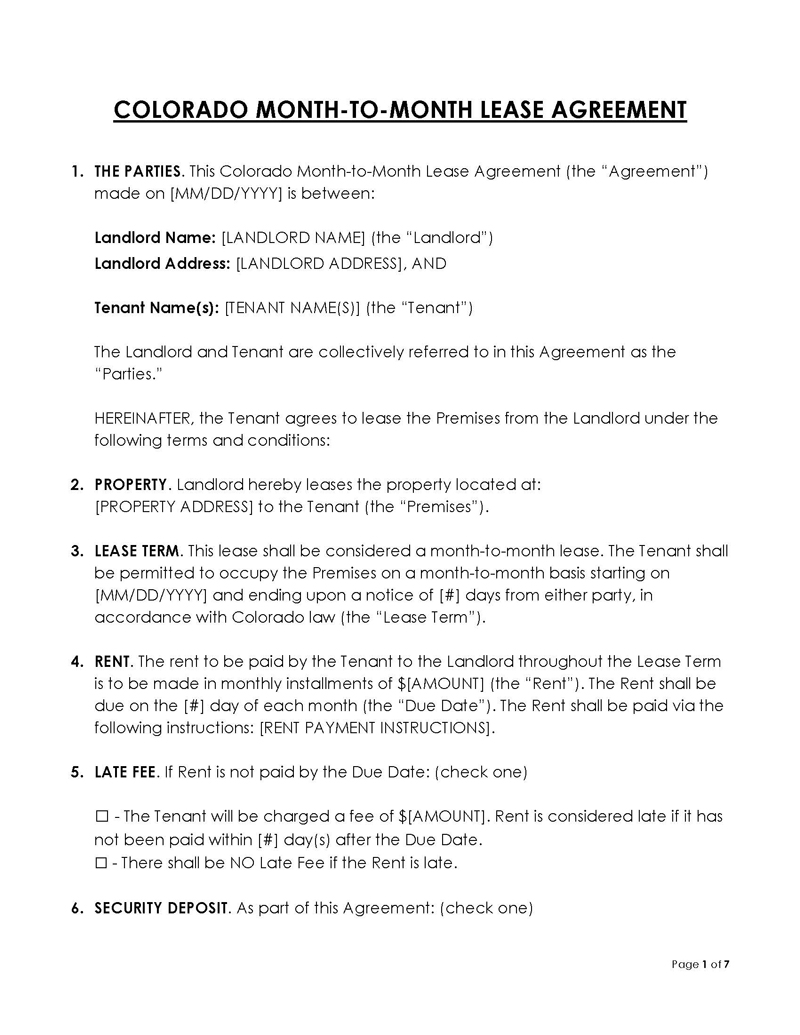
According to Colorado Landlord-Tenant Rights (C.R.S. Title 38, Art. 12): Colorado Revised Statutes, a month-to-month lease agreement is an at-will tenancy contract, usually for a period of 30 days. It can either be a written or oral agreement. The lease terms include the landlord’s obligation to provide a habitable living space, the tenant’s obligation to pay rent on the agreed date, and all other rights and responsibilities of both parties (landlord and tenant).
Rent-to-own
A rent-to-own lease agreement is a legally binding tenancy contract between a landlord and tenant that combines a lease term with an option to purchase the property by the end of the agreement, as authorized by (C.R.S. Title 38, Art. 12): Colorado Revised Statutes. Although the tenant is not obligated to buy the property, they can simply renew the lease term. However, this will nullify any prior financial investment or agreement toward the purchase.
Roommate
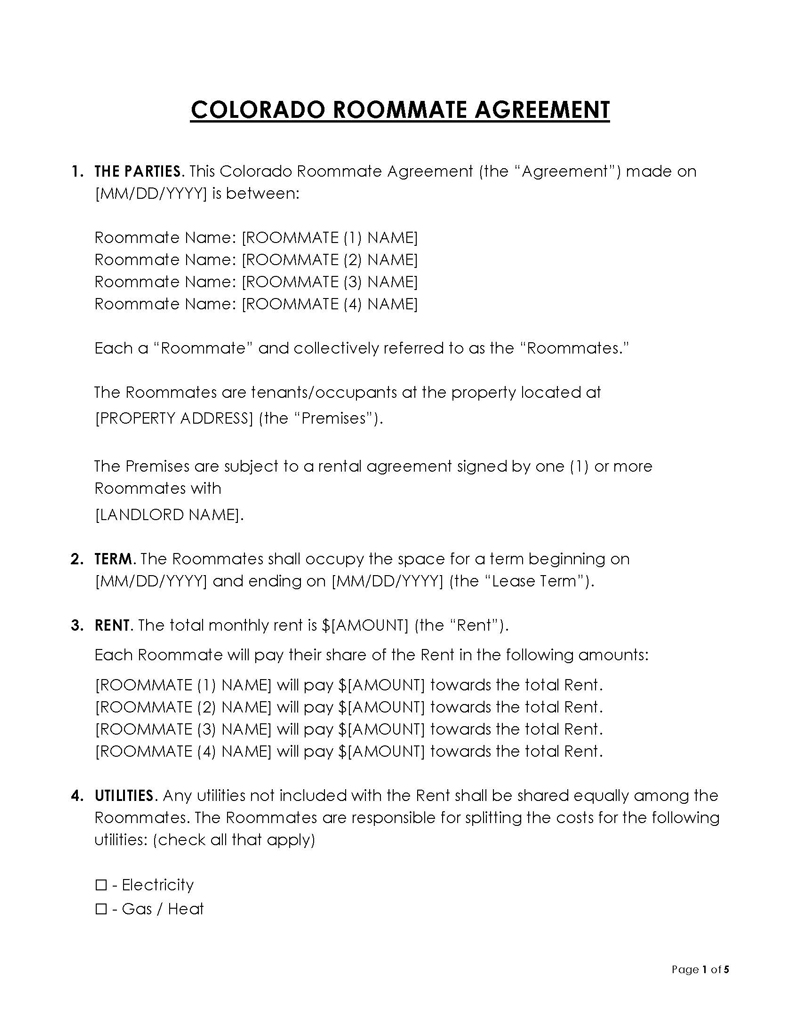
A roommate lease agreement is a legally binding contract between individuals living together in the same living space in Colorado. It defines all the rules, regulations, and responsibilities that are associated with living with another company, like cleaning up after yourself, splitting rent and utilities, and property maintenance. It is completely different from other agreements because it only involves roommates who dwell on the property and does not bind the landlord.
Standard
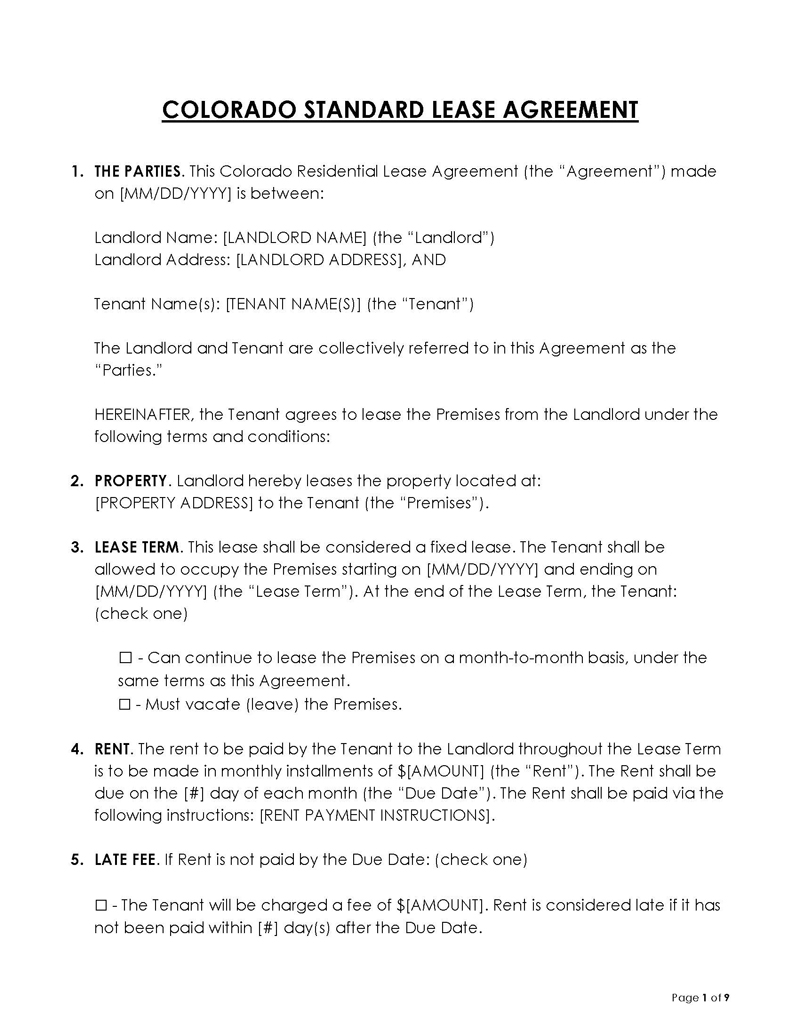
According to the Colorado Revised Statutes—Title 38 > Article 12 (Tenant & Landlord), a standard lease agreement is a legally binding contract between a landlord and tenant regarding the tenancy terms and conditions of a residential property in Colorado. Usually, it is binding for one year but may be tailored according to the needs of the tenant if acceptable by the landlord. It will specify the rental amount, security deposits, property maintenance requirements, pet policies, compliance with state laws, multiple tenants, and other requirements.
Sublease
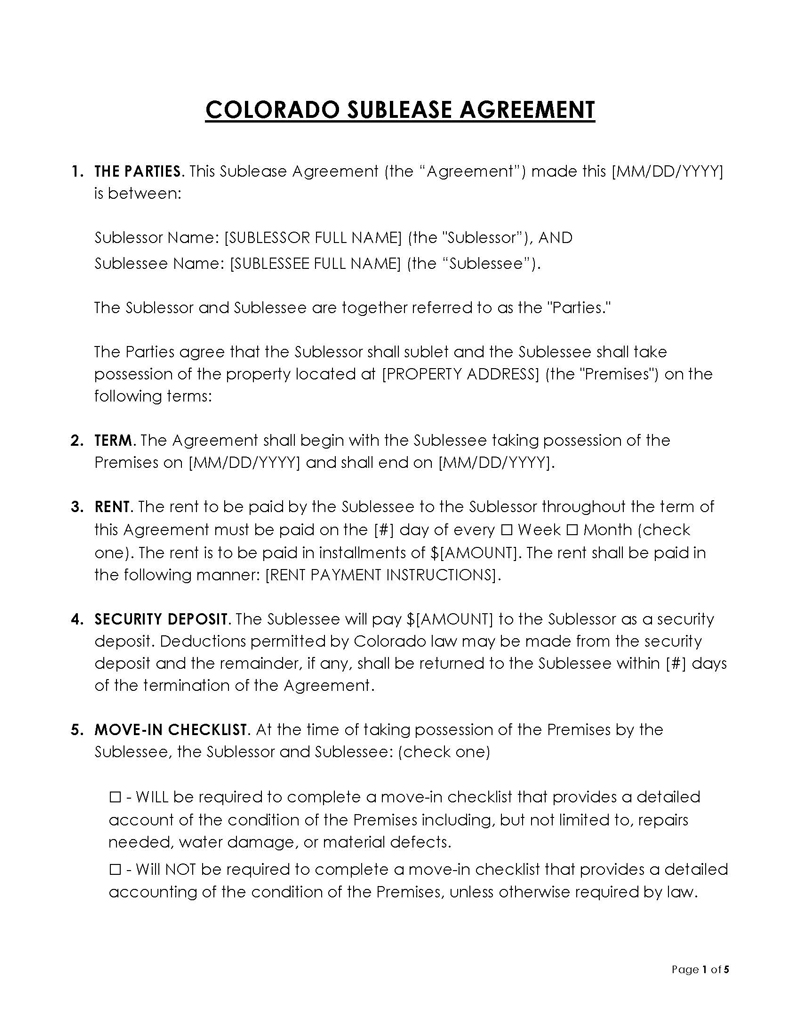
A sublease agreement is a legally binding contract agreement in Colorado that defines the tenancy obligations and responsibilities of a subtenant towards the original tenant and the landlord. The original agreement between the tenant and the landlord remains valid, while the sublease agreement only serves as proof of the subtenant’s right to the property and evidence of consent from other parties associated with the property (tenant and landlord). After all the parties (landlord, tenant, and subtenant) sign the document, the subtenant becomes the tenant and begins to live on the property.
Creating a lease agreement from scratch may seem like a daunting task, but with our customizable templates, you can save time and effort by following exactly what is needed to be compliant. Moreover, these templates are free to download and easy to use.
Final Thoughts
If you are a landlord in Colorado, you must familiarize yourself with the requirements for a lease agreement. Whether your property is residential or commercial, identifying one specific to your property’s requirements matters. In order to create a valid lease agreement, both parties (landlord and tenant) must meet all the requirements, including providing disclosure notices and having the document signed. You can get assistance from our free and customizable templates.
